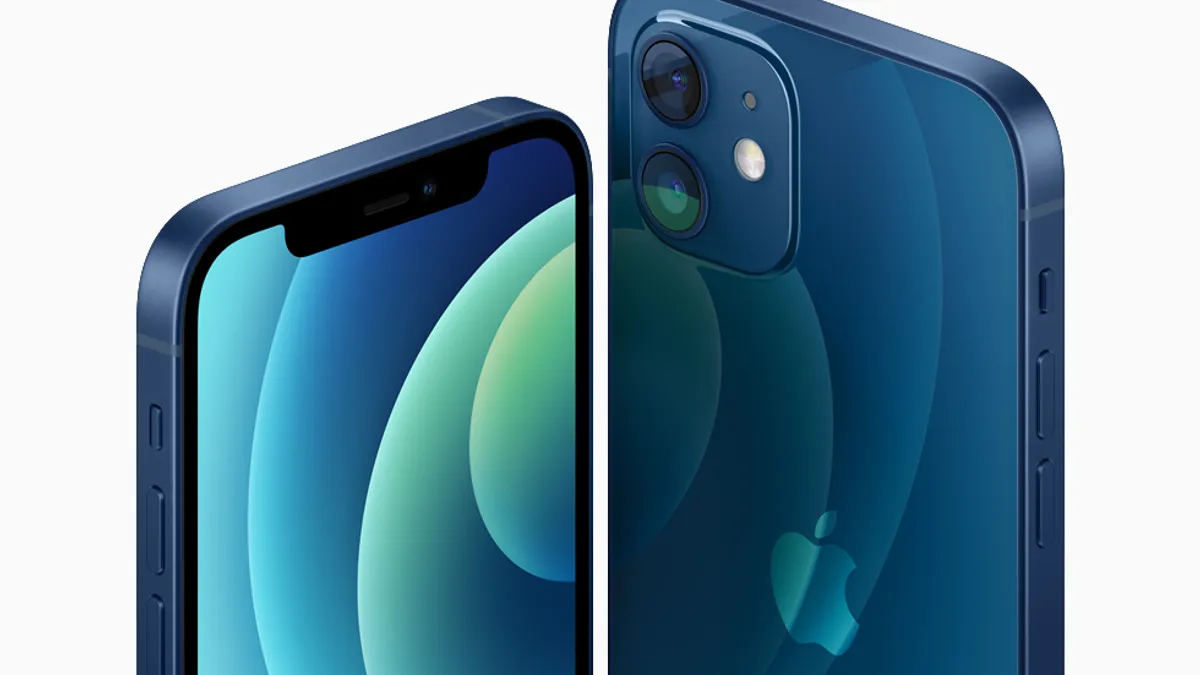Brief:
- Apple introduced four iPhone 12 models that connect to higher-speed 5G cellular networks, heralding a "new era" for its best-selling smartphones, per an announcement. In the company's second virtual product event this year, executives including CEO Tim Cook showcased dozens of new features to explain why 5G marks a major advancement in the user experience.
- Apple showed how professionals can use 5G iPhones to handle a variety of tasks, ranging from speedy downloads of potentially life-saving medical images to designing factories while working remotely. Its 5G lineup ranges in size and features, including the iPhone 12 Mini (staring price of $799), iPhone 12 ($799), iPhone 12 Pro ($999) and Pro Max ($1099). Customers can preorder the iPhone 12 and 12 Pro on Friday, or wait until Nov. 6 to preorder the Mini and Pro Max.
- The long-awaited introduction of a 5G iPhone came on the same day that Verizon expanded its 5G Ultra Wideband service, its fastest tier, to 55 cities, 43 stadiums and arenas and seven airports, a pair of moves that should open 5G to more consumers.
Insight:
Apple's introduction of a 5G iPhone is one of its most significant product rollouts in years, and promises to change the way that mobile marketers reach, engage and transact with consumers. The company's presentation mostly focused on the inner workings of the iPhone 12 line, but the company also showed off several applications for its more powerful chips, especially when connected to a 5G network that's 10 to 100 times faster than 4G networks. In explaining the advantages of 5G, Apple indicated that it recognizes many mobile users aren't familiar with the newer technology.
Verizon CEO Hans Vestberg also appeared during the event, acknowledging the tepid consumer response to 5G so far while also suggesting that Apple's latest generation of iPhones will spur greater interest in upgrading to the higher-speed service. Even with Verizon's expansion of its 5G service, 5G is still in the early stages of its U.S. build-out, with Verizon's rivals AT&T and T-Mobile also offering varying levels of service nationwide. Plus, as Verizon is splitting its 4G spectrum to service 5G, consumers should not expect the much faster speeds that 5G is capable of just yet, per PC Mag.
5G smartphones are gaining traction, however, growing from 3% of total U.S. smartphone sales in January to 14% in August, a recent study indicated. While many consumers may wait to upgrade until service improves, Apple's marketing muscle likely will help to make people more aware of 5G when they're buying their next smartphone.
For Apple, the next generation of iPhones is important for the tech giant to rebuild sales momentum for its devices and support its growing services business. The company's iPhone sales rose 1.7% to $26.42 billion in the June quarter from a year earlier, the slowest of product categories that include iPads, Mac computers, wearables and smart-home devices, per its quarterly earnings report. Its services business saw 15% sales growth to $13.16 billion as people subscribed to services like Apple Music, bought apps in the App Store and made in-app purchases. Apple last month announced plans to start selling its services in a discount bundle called Apple One, a move that's likely to increase its subscription revenue.
The biggest effect that Apple will have on mobile marketers will come from its planned change to the software that runs iPhones, iPads and Apple TV. Early next year, the company's iOS 14, iPadOS 14 and tvOS 14 will require apps to obtain permission to track users with its Identifier for Advertisers (IDFA), a randomly generated code that the company assigns to devices. The IDFA, which users already can block by changing the settings in their Apple devices, helps marketers to track user activities and improve their ad targeting. With the planned change, a pop-up will appear that gives device users a choice to stop device tracking after they download or update an app. Because many device users aren't likely to allow app tracking, the targeting of mobile ads will more difficult for marketers.
If the new iPhones are a success, this could be a much needed win for Apple, which is facing several challenges beyond slowing sales. In recent, the company's management of the App Store has become a source of controversy as companies like Spotify and Epic Games, the maker of "Fortnite," accuse the company of unfair business practices. Apple is among the tech giants that face growing antitrust scrutiny in several regions worldwide because of their dominance in key parts of the digital economy. Last week, a congressional committee on antitrust released a report claiming that Apple stifles competition, a charge the company has denied, CNBC reported.











